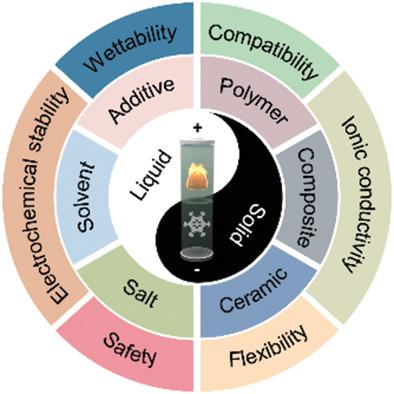当前位置:
X-MOL 学术
›
Adv. Energy Mater.
›
论文详情
Our official English website, www.x-mol.net, welcomes your
feedback! (Note: you will need to create a separate account there.)
Rechargeable Battery Electrolytes Capable of Operating over Wide Temperature Windows and Delivering High Safety
Advanced Energy Materials ( IF 24.4 ) Pub Date : 2020-10-11 , DOI: 10.1002/aenm.202001235 Xidong Lin 1 , Guodong Zhou 1 , Jiapeng Liu 1 , Jing Yu 1 , Mohammed B. Effat 1 , Junxiong Wu 1 , Francesco Ciucci 1, 2
Advanced Energy Materials ( IF 24.4 ) Pub Date : 2020-10-11 , DOI: 10.1002/aenm.202001235 Xidong Lin 1 , Guodong Zhou 1 , Jiapeng Liu 1 , Jing Yu 1 , Mohammed B. Effat 1 , Junxiong Wu 1 , Francesco Ciucci 1, 2
Affiliation

|
Li‐ion batteries (LIBs) are the energy storage systems of choice for portable electronics and electric vehicles. Due to the growing deployment of energy storage solutions, LIBs are increasingly required to function safely and steadily over a broad range of operational conditions. However, the conventional electrolytes used in LIBs will malfunction when the temperatures fall below zero or elevate above 60 °C. Further, conventional electrolytes are toxic and flammable, leading to severe safety risks, especially in the case of an accident or overheating. Therefore, an ever‐growing body of research has been dedicated to the development of electrolytes characterized by high ionic conductivity, excellent electrochemical stability, and operability over a wide temperature range. In this Progress Report, the optimization of liquid‐based electrolytes achieved by controlling Li salts, functional additives, and solvents is discussed first. Next, gel‐polymer and all‐solid‐state electrolytes (i.e., ceramics, polymers, and their composites) are presented. Examples of advanced batteries (Li/Na/Zn‐ion batteries and Li‐metal batteries) capable of working over a broad temperature window are highlighted. Morever, recent computational studies aimed at designing and understanding electrolytes are reviewed. Finally, challenges and perspectives regarding emerging electrolyte materials are proposed with the goal of triggering the further development of high‐performance, safe, and wide‐temperature‐operating electrolytes.
中文翻译:

可在宽温度范围内运行并提供高安全性的可充电电池电解质
锂离子电池(LIB)是便携式电子产品和电动汽车的首选储能系统。由于储能解决方案的部署不断增长,人们越来越需要LIB在广泛的运行条件下安全稳定地运行。但是,当温度低于零或高于60 °时,LIB中使用的常规电解质会发生故障。 C.此外,常规电解质是有毒和易燃的,导致严重的安全隐患,尤其是在事故或过热的情况下。因此,不断发展的研究致力于开发具有高离子电导率,出色的电化学稳定性和在宽温度范围内可操作性的电解质。在本进展报告中,首先讨论了通过控制锂盐,功能性添加剂和溶剂实现的基于液体的电解质的优化。接下来,介绍了凝胶聚合物和全固态电解质(即陶瓷,聚合物及其复合材料)。重点介绍了可以在较宽的温度范围内工作的高级电池(锂/钠/锌离子电池和锂金属电池)示例。而且,综述了旨在设计和理解电解质的最新计算研究。最后,提出了有关新兴电解质材料的挑战和观点,目的是触发高性能,安全和宽温度运行的电解质的进一步发展。
更新日期:2020-11-17
中文翻译:

可在宽温度范围内运行并提供高安全性的可充电电池电解质
锂离子电池(LIB)是便携式电子产品和电动汽车的首选储能系统。由于储能解决方案的部署不断增长,人们越来越需要LIB在广泛的运行条件下安全稳定地运行。但是,当温度低于零或高于60 °时,LIB中使用的常规电解质会发生故障。 C.此外,常规电解质是有毒和易燃的,导致严重的安全隐患,尤其是在事故或过热的情况下。因此,不断发展的研究致力于开发具有高离子电导率,出色的电化学稳定性和在宽温度范围内可操作性的电解质。在本进展报告中,首先讨论了通过控制锂盐,功能性添加剂和溶剂实现的基于液体的电解质的优化。接下来,介绍了凝胶聚合物和全固态电解质(即陶瓷,聚合物及其复合材料)。重点介绍了可以在较宽的温度范围内工作的高级电池(锂/钠/锌离子电池和锂金属电池)示例。而且,综述了旨在设计和理解电解质的最新计算研究。最后,提出了有关新兴电解质材料的挑战和观点,目的是触发高性能,安全和宽温度运行的电解质的进一步发展。






























 京公网安备 11010802027423号
京公网安备 11010802027423号